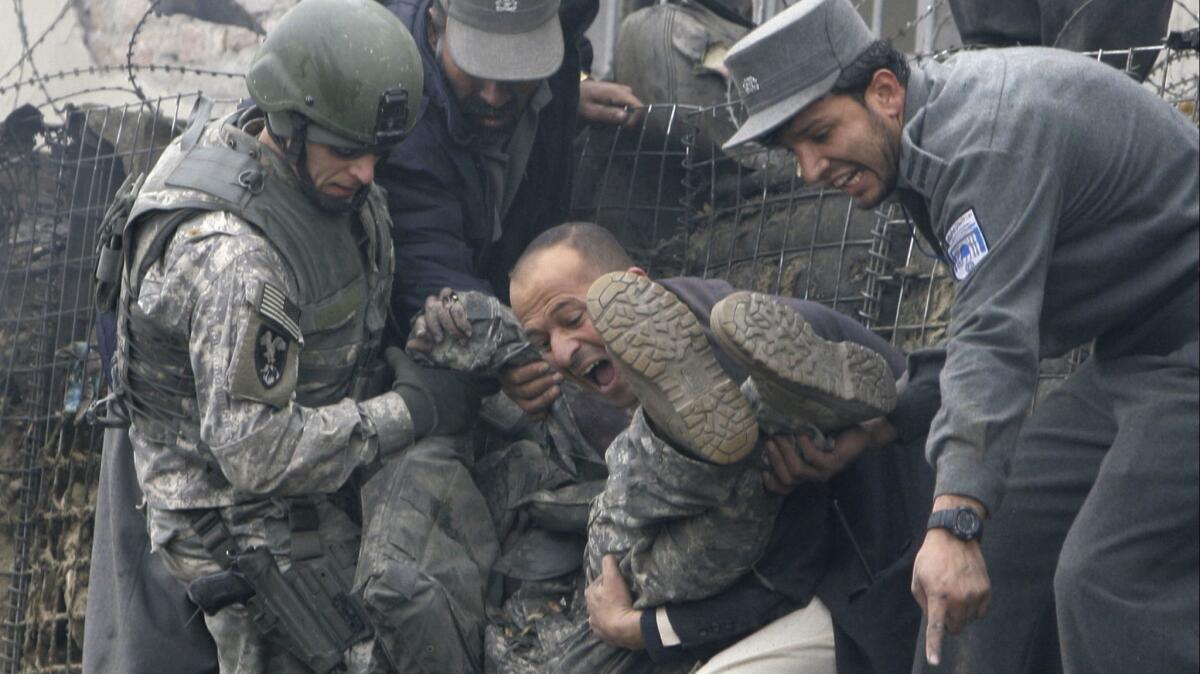Editorial: Between the Memorial Day sales, picnics and chores, let’s remember: War is still hell

- Share via
On Memorial Day, the nation commemorates American service members who have died in the waging of war, though our recognition falls short of full attention, what with special sales at shops, neighborhood picnics, quick getaways to Vegas and the kind of chore-doing that often gets relegated to a three-day weekend.
When we do stop to focus on those who gave their lives in battle, we often think in terms of glory and sacrifice, and allow that to obscure the basic nature of the battles in which they fell, the brutality and inhumanity of the conflicts that killed them. Not that war can always be avoided; nor is it always unjustified. The Allies who joined to oppose Nazi Germany in World War II were certainly on sound moral footing. But even then, some of the ways in which they waged that war — in Dresden, Hiroshima and Nagasaki, for instance — raised profound ethical questions that have not been answered to this day.
For the record:
4:05 p.m. May 29, 2018An earlier version of this editorial incorrectly stated that the armistice ending the Korean War was signed on July 17, 1953. It was signed on July 27 of that year.
It’s worth mulling such things on this Memorial Day, in particular. President Trump is tough talking when it comes to the U.S. military. He seems, at times, to be itching for a fight (perhaps related to the fact that he himself never served). Sure, it might all just be bluster, part of a negotiating strategy, a la President Nixon and his “madman theory,” in which he tried to persuade North Vietnam that he was just crazy enough to use nuclear weapons. But it didn’t work then, and isn’t likely to work now; Trump’s threats — such as his promise to unleash “fire, fury and frankly power, the likes of which this world has never seen before” on North Korea — seem more likely to erode international trust in the U.S. as a reliable global leader.
As we’ve seen in Afghanistan, Iraq and Syria, there is no way to make war palatable or low-risk or death-free. Soldiers die, and civilians die too.
This week it also seems appropriate to recall the Korean War, which ended with an armistice signed 65 years ago — on July 27, 1953. The Times Editorial Board at the time took note of it in a couple of ways. One was to join a call for donations to a fund to help address the humanitarian toll of the conflict. It cited a report by investigators for the American-Korean Mission, who found that 85% of both Koreas had been destroyed. The fighting left 9 million homeless people, most of them children; 1 million war casualties including 15,000 amputees; 300,000 wives widowed; and 100,000 orphans. Tuberculosis, typhoid and other contagious diseases afflicted the survivors, few of whom could find treatment facilities because 80% of the hospitals had been destroyed. Those numbers don’t even take into account the 34,000 U.S. soldiers killed in action and the more than 100,000 wounded, or the 217,000 South Korean, 206,000 North Korean and 600,000 Chinese troops who lost their lives. All in a war — technically a United Nations “police action” — that lasted three years.
War is more sterile, and distant these days. People manning joysticks thousands of miles away direct drones to attack enemy combatants. But as we’ve seen in Afghanistan, Iraq and Syria, there is no way to make war palatable or low-risk or death-free. Soldiers die, and civilians die too. War is waged through killing, whether it be a bayonet run at Pickett’s Charge during the Civil War or U.S. troops ripped apart by IEDs alongside roadways in Middle East desert towns.
The day after the armistice was signed in Korea, The Times noted that even though the fighting had been put to an end, the conflict was not over. “The killing has stopped for a while, but the soldiers will stay in Korea for a long time, probably, dug in along the southern edge of no-man’s land,” The Times wrote. “Peace in Korea can come only after long, frustrating negotiations while our soldiers stand by.” Seven decades later, they’re still there, even as Trump and Kim Jong Un trade insults and cancel summits.
And here on Memorial Day it behooves us not only as a nation, but as people, to be wary of the wars of the future, because they really will not be so different from the wars of the past. War is still hell.
Follow the Opinion section on Twitter @latimesopinion and Facebook
More to Read
A cure for the common opinion
Get thought-provoking perspectives with our weekly newsletter.
You may occasionally receive promotional content from the Los Angeles Times.










